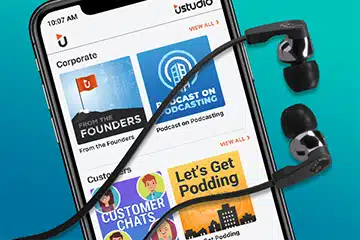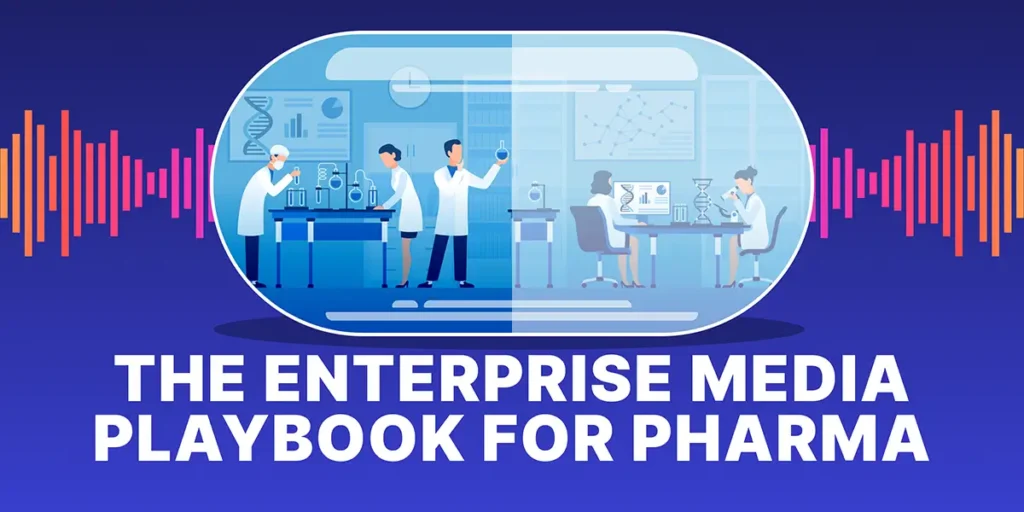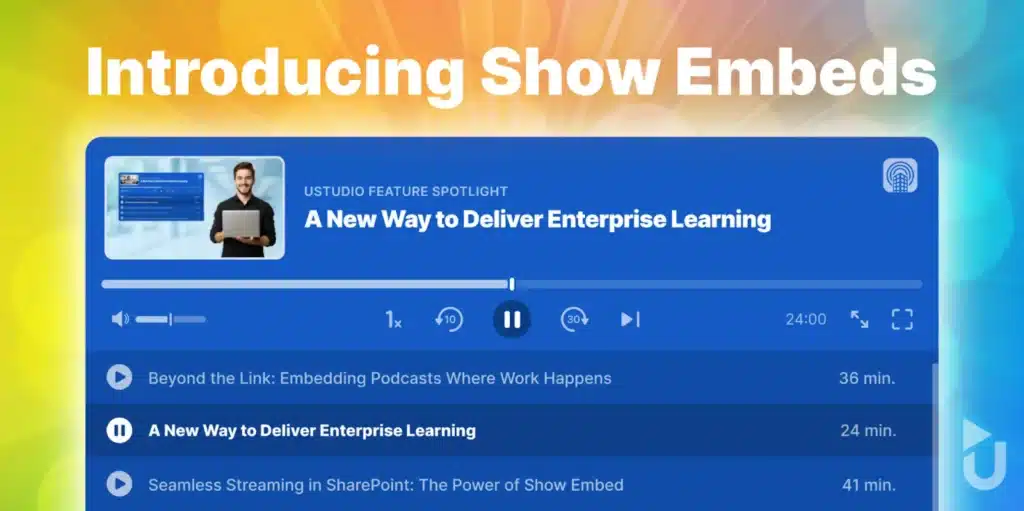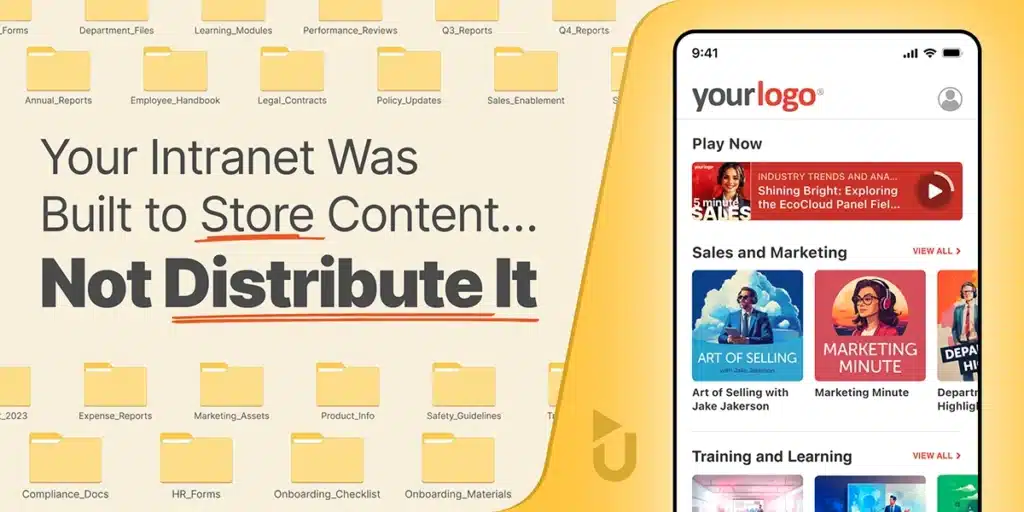6 Features Every Private Podcasting Platform Should Include
Jackie Logan | Podcasting

With the rise of remote and hybrid work, more flexible communication and training tools are on everyone’s mind. Traditional in-person training or synchronous virtual meetings are often less practical for distributed teams. So, how do you connect with hard-to-reach employees? Podcasting.
With nearly 550 million podcast listeners globally, and 47% of the U.S. adult population listening to podcasts regularly (up 10% in just four years), it only makes sense for enterprises to explore this communication channel. It’s an outlet that’s familiar, clearly desired, and accessible anytime, anywhere.
There is no shortage of public podcasting platforms, and today even private enterprise podcasting platforms are growing in number. This makes it challenging for corporations to find the right solution that will be readily adopted and generate the best ROI. Thankfully, there are a number of distinguishing features that can be used to help set platforms apart and ensure businesses get the services and functionality they need.
What Is a Private Podcasting Platform?
A private podcasting platform is a specialized service or technology that allows organizations to create, distribute, and manage audio content (podcasts) securely, with restricted access to a specific audience, typically employees or members of an organization. Unlike public podcast platforms (like Apple Podcasts or Spotify), which are open to anyone with internet access, private podcasting platforms ensure that only authorized users can listen to the content.
Enterprises use private podcasting platforms to streamline and enhance communication, training, and employee engagement in ways that are secure, scalable, and modern. These platforms provide a private, controlled environment for delivering audio content, tailored to the needs of a company's workforce—especially for remote or traveling employees.

The use cases for secure podcasting range and SMBs through enterprise-level organizations are using this new frontier for all kinds of communications. Some examples of what enterprises can do with private podcasting platforms include:
- Leadership updates: Regular updates from the CEO or other executives to keep the company aligned with goals and strategies.
- Onboarding: Streamline new employee onboarding by offering podcasts that cover company policies, culture, and role expectations.
- Sales enablement: Provide sales teams with bite-sized training or updates on new products, features, and customer success stories.
- Compliance training: Distribute mandatory compliance or regulatory training with easy tracking of who has completed listening.
- Employee well-being: Deliver mental health and wellness content to support employee well-being and work-life balance.
- Project updates: Regularly update distributed project teams on key milestones or new developments.
Instead of sending out an email or asking employees to block off a certain time during the day to attend a webinar or video conference call, something that is nearly impossible to get 100% attendance, try private podcasting instead. You can offer a live podcast or prerecord and add it to your private enterprise channel that employees can access whenever they can. Worried they won’t bother? Top private podcasting platforms offer insights and analytics into who listened to which podcasts, when they listened, how long they listened, and if they listened to the entire podcast.
Why Use a Private Podcast Platform Instead of Public Platforms?
Public platforms are fine for gaining public visibility, but private podcasting platforms are essential for enterprises wanting to keep their training, company news and employee communications within a secure environment that only authorized users can access.
There are at least three reasons a private podcast platform is better than a public channel:
- Confidentiality: Public podcasting platforms don't offer content control, meaning anyone with a link can access the material. Private platforms ensure that proprietary content stays within the company.
- Brand and Experience Control: Public platforms lack customization for company branding and might expose users to ads or third-party content. Private platforms create a more professional, ad-free experience.
- Tracking and Reporting: Public platforms offer minimal analytics. In contrast, private platforms provide detailed insights into employee engagement and content effectiveness, which is crucial for training, compliance, and feedback.
Benefits for Enterprises
Enterprises are always looking for new ways to engage employees, many of whom work remotely or constantly travel. Requiring in-person training is nearly impossible, and emails with PDFs are rarely read. Still, according to Training magazine, U.S. companies spent nearly $102 billion in 2022-2023 trying to reach their employees. Learner engagement is cited as a major challenge, as was a lack of personnel.
One training and communication channel is gaining steam: podcasting. The report found that nearly one-third of large companies surveyed are currently using podcasting as a training tool. Here’s why:
- Scalability: Companies can distribute a single piece of content to all employees simultaneously, saving time and effort.
- Cost-Effectiveness: It reduces the costs associated with in-person training, travel, and physical materials.
- Consistency: Private podcasting ensures that all employees receive the same message or training in a consistent manner, which can be difficult to achieve with traditional communication or training methods.
- Convenience: Employees can listen at their own pace and on the go, such as in their car or airplane, making it ideal for a distributed or remote workforce.
6 Must-Have Features of an Enterprise Podcasting Platform
Enterprise content in the form of audio and video podcasts are precious cargo. Below are six non-negotiable features that make a private podcasting platform an excellent investment.
Watch: The Top Features of an Enterprise Podcasting Platform
Security Above All Else
Security is at the front of everyone’s minds as work continues to become more digital. Gartner reports that security threats are among the top CIO pain points. The central idea of private podcasting is that only approved users can listen to an organization’s content, and a solid security system will protect internal users while keeping the content secure.
The best enterprise podcasting platform prioritizes security at every level, protecting content beyond SSO authentication by having checks at the server, stream, and player levels. Content can’t be forwarded to a new device or user outside of the corporate network, which keeps the circle closed and the content protected. A patented multi-tier media security architecture provides ultimate private podcasting peace of mind.
Full Support in One Application
Our desktops and mobile phones are more cluttered than ever. One study showed that the average smartphone user accesses 46 apps a month, which makes it difficult to keep up with the digital library as more apps continue to hit the market. It’s overwhelming to have a separate app for logging in, a different app for audio podcasts, and yet another app for video content.
An all-in-one platform means there is no extra bulk for setup or users. Enterprise users can enjoy the same quality and convenience as consumers with self-contained desktop and mobile apps. Not only do audio, video, and live content exist under the same roof, but the collective house is secured with analytics and more behind-the-scenes features to make the experience even better.
Media-First and Familiar Controls
Content platforms can have the best intentions and features, but an unwelcoming interface will hinder adoption and undermine the intent. Users want to see systems that look familiar with controls they are used to, so there are no new barriers restricting access to enterprise content.

The best private podcasting platforms will offer users an easy-to-navigate user interface that looks familiar. It will have categories, playlists, and episode descriptions—the standard controls music and podcast listeners have come to expect. There will be no learning curve, which means fewer hurdles to achieving adoption and engagement.
Detailed and Granular Analytics and Insights
Every content creator wants to know how their content performs, making analytics a must. The solution should offer detailed metrics that give insight into improving future content. Media streaming data and analytics tells you if, how, and by whom your content is consumed — something read-write channels cannot produce.

The custom dashboard and detailed reports show a range of metrics like number of plays, percentage of an episode played, named users, modality (mobile, desktop), and more. The slew of analytics and metrics lets you identify your show’s biggest supporters and most successful content while also providing insight to inform your content strategy moving forward.
The Power of APIs and Platform Flexibility
Even though the platform is closed and secure, your content should not be limited to the platform alone. The same system that keeps your content safe should allow your organization to host content on other platforms without worry.
Proxies, APIs, and off-site storage systems protect your content without limiting its reach and offer organizations the flexibility to use their content across online platforms. You will never see most of these systems working in the background, but you’ll enjoy the benefits they supply.
Proven Partner Model Enables Business Success
The best enterprise podcasting providers should aim to be the best partner for businesses exploring private podcasting, developing a proven method that provides the right amount of support without being overbearing or negligent.
Check to see if the platform offers launch planning, audience growth plans, performance measurement, and integrations. Support should not end with the guided services, either. Your provider should always be there to help. Aside from 24/7 email support, you’ll want access to online chat and a customer success manager during business hours.
Be Where Your Employees Are
Private podcasting can be an incredible tool for organizations to reach employees and foster company culture in today’s modern work environment. With around 22 million U.S. adults working remotely all the time and 41% all the time, it’s no wonder companies are trying to figure out how to keep their employees connected with management and each other and aligned with corporate initiatives.
Look around an airport, busy sidewalk, coffee shop or bus, and you’ll find the vast majority of people wearing earbuds or headphones. It’s how people spend their downtime, their waiting time, their drive times, their “don’t bother me” time. And that’s exactly where enterprises need to be if they want to get the attention of their audience. On the flip side, look at the dismal email open rates. Forbes reported up to 71% of employees don’t read company emails. Private podcasting platforms are a better option.
If you’re interested in maximizing the full power of internal podcasting, our experts are here to make the process as smooth as possible. Contact us today to learn how uStudio can put our defining features to work for you.
I am an experienced Go-to-Market and product development leader of SaaS solutions across several industries, both commercial and government. I blend creativity, strategy, and research to launch and evolve products with a knack for asking the right question at the right time to expose unspoken market needs. I leverage my crisp communication skills to organize cross functional teams, manage high-profile client success, and publish public-facing product marketing material.


